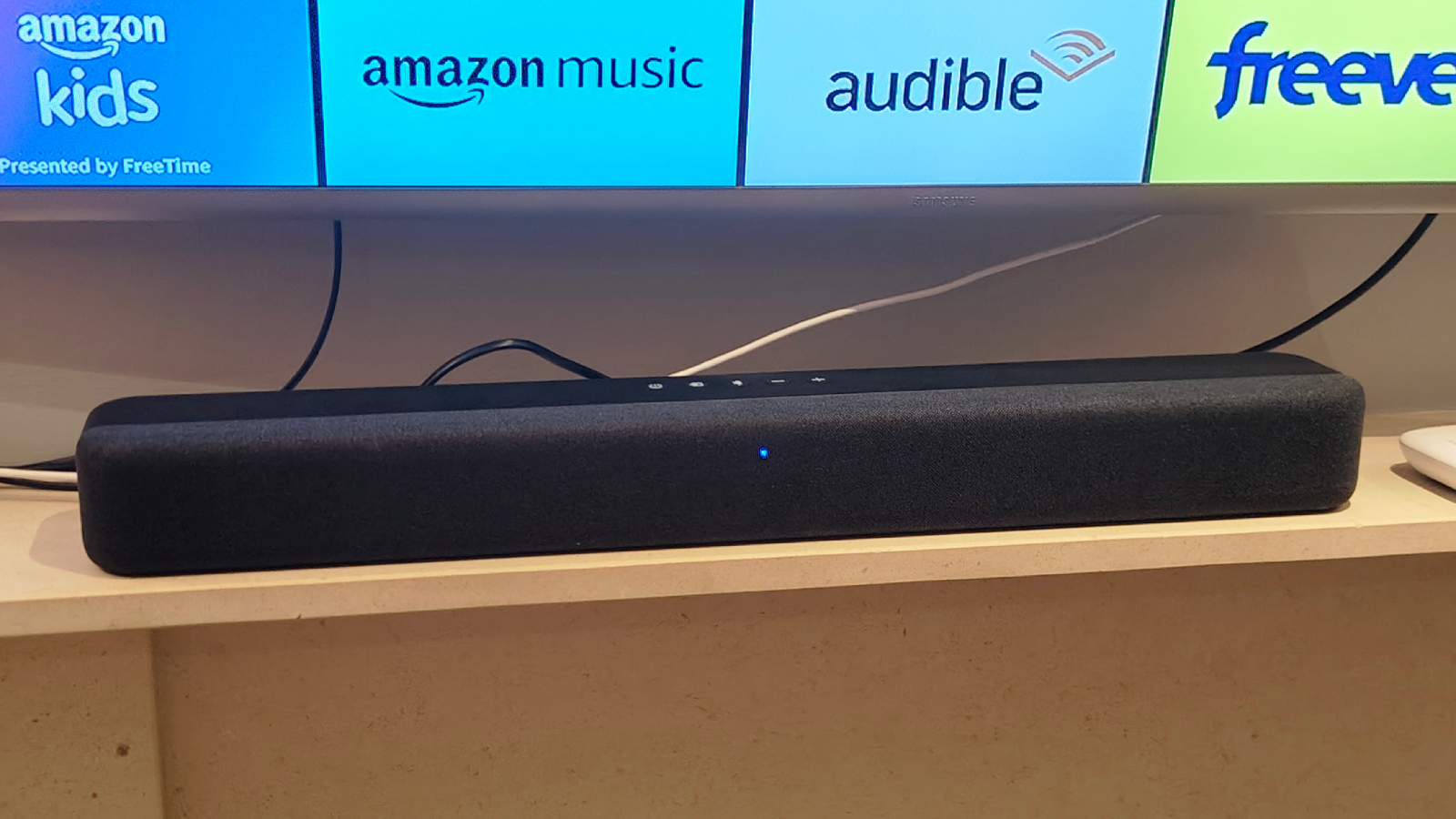
Amazon Fire TV Soundbar quick review
The Amazon Fire TV Stick is the ubiquitous device for streaming sticks: these Bezos-bred dongles plug into your TV to turn it into a smart TV, and they’re both affordable and easy to use. Not content with making one kind of streaming product, though, Amazon has started to produce its own versions of other home theater gadgets: introducing the Fire TV Soundbar.
This is a more affordable alternative to the Amazon Fire TV Soundbar Plus, which was unveiled a year later, and honestly I think most people will find this non-Plus model preferable.
A soundbar is a bar-shaped loudspeaker that sits under (or near) your TV set, and it’s designed to offer much better-sounding audio for your TV shows or movies than your set’s built-in speakers.
Tom Bedford is What to Watch's streaming writer, and so he uses various paid and free streaming services for his day-to-day job.
He has a history of reviewing tech gadgets for various websites including our sister sites TechRadar, Top Ten Reviews and Creative Bloq, and leads WTW's hardware coverage.
A good soundbar can be one of the most expensive items in your home theater system (search "Soundbar" in Amazon and sort by "Price: High to low" if you don’t believe me!) but in keeping with the company’s way of operating, the Amazon Fire TV Soundbar is a pretty affordable option.
You’re probably considering the Fire TV Soundbar if you’re new to this area of tech — the price positions it perfectly as an entry-level option. You don't need a Fire TV device to use it, and it'll work alongside your TV on its own, however, it doesn't have the Amazon-created software baked in. That is to say it's not a streaming device in its own right and you'll need to buy one of those separately if you want to turn your TV into a smart TV.
Unfortunately it’s not perfect as a device for "newbies" — not if we use the ease and simplicity of Amazon’s Fire TV sticks as a baseline. I found the device very fiddly set up, and I imagine technophobes will find it a nightmare (or will have to pay extra for an installation option which Amazon offers in some areas).
Once you’ve got the soundbar working as intended, you’ll find that it’s a pretty decent audio option in terms of sound offerings, and it offers a few perks like Dolby Audio and DTS:Virtual X (the former is for surround-sound, and the latter is for creating more immersive audio in soundbars).
I have a fairly low-end TV and the Amazon Fire TV Soundbar offered audio that was much better than what the set offers, so if you want great sound for your movies or TV without buying a brand-new set, it’ll be a worthy option. The volume was also impressively loud, much more so than my set can reach, so it’ll be a worthy gadget for improving your home theater set-up in that way.
Bear in mind that despite a few kinks, this is an entry-level option: people who’ve already invested cash in their sofa cinema arrangement will find much better options on the market than the Amazon Fire TV Soundbar (that they’ll need to pay dearly for). However if you’ve just got a TV that you didn’t spend much on, and want to eke out some extra enjoyment from it, it’s a great pick.
Amazon Fire TV Soundbar price information
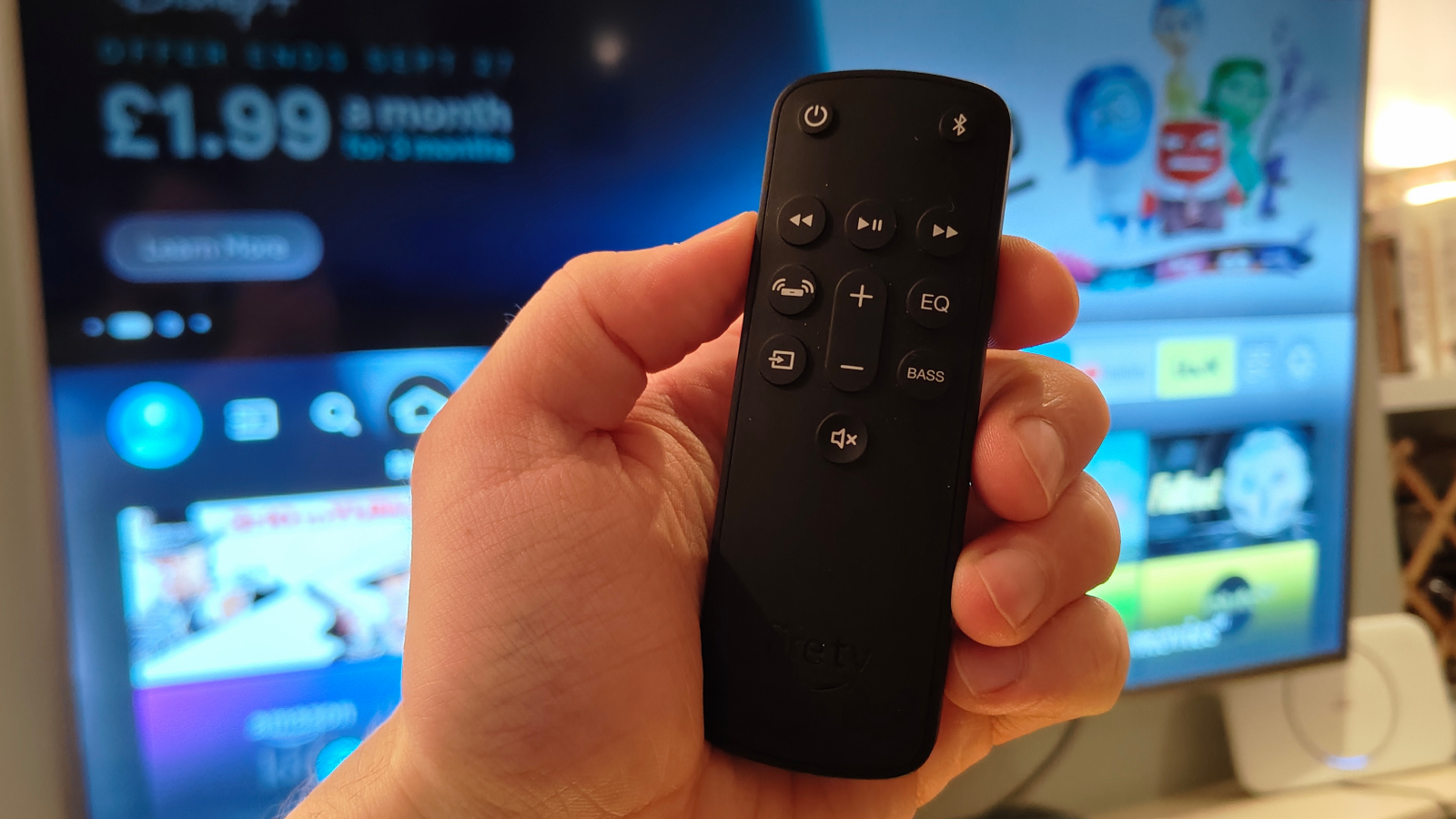
- Costs $119.99 / £119.99, not on sale in Australia
- In some regions you can pay more for installation
- Towards the lower end of the soundbar market
The Amazon Fire TV Soundbar was released in 2023 in the US and slowly rolled out worldwide, arriving in the UK in 2024.
The Amazon Fire TV Soundbar price is $119.99 / £119.99 (that’s roughly $200 in Australia, but it’s not on sale there yet) and it’s something I’d expect to see heavily discounted around the various Prime Days and Black Fridays.
If you don’t want to set up the soundbar yourself and live in the UK, you can pay £74 extra to have it installed for you, but this option isn’t offered in the US.
Unlike Amazon’s many other Fire TV devices, this cost means it’s not the cheapest option on the market by any means, with the cheapest alternatives on Amazon costing half that. However there are plenty of other options that’ll set you back much, much more, so it’s still towards the more affordable end of the spectrum.
One thing to note is that you need to already have a Fire TV Stick or Fire TV Cube in order to use the soundbar — unlike the Roku Streambar, a rival from another streaming stick company, it doesn’t have built-in streaming functionality.
Amazon Fire TV Soundbar set-up
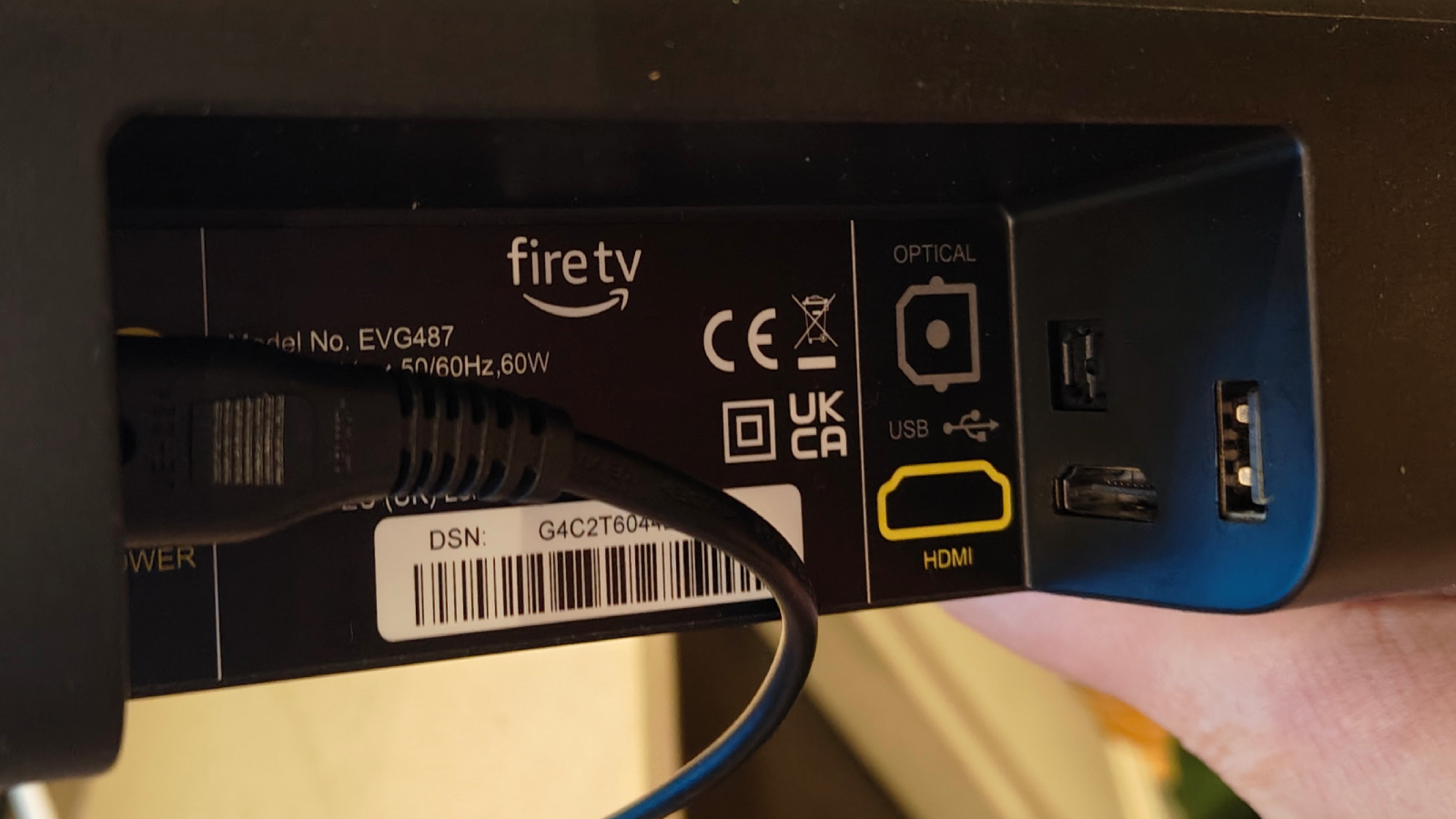
- Fiddly and complicated set-up process
- Can connect wired or with Bluetooth
- Doesn't require a streaming stick, but one is recommended
I’ve been reviewing tech for over half a decade and I’m not ashamed to admit that I struggled to set up the Amazon Fire TV Soundbar — if you’re not techy, I’d recommend you pay a little extra for the installation.
You technically don’t need a Fire TV Stick or Cube to use the Fire TV Soundbar, although you'll probably already have one if you're considering this Amazon device. The soundbar alone won't give you access to Fire TV, Amazon's smart TV software, so you'll need a streaming device or smart TV already for this.
The way I eventually managed to get the soundbar to work was simply to pair it via Bluetooth with my TV — this is one of your options to set it up, though you’ll need a set that has Bluetooth and you will miss on some features this way.
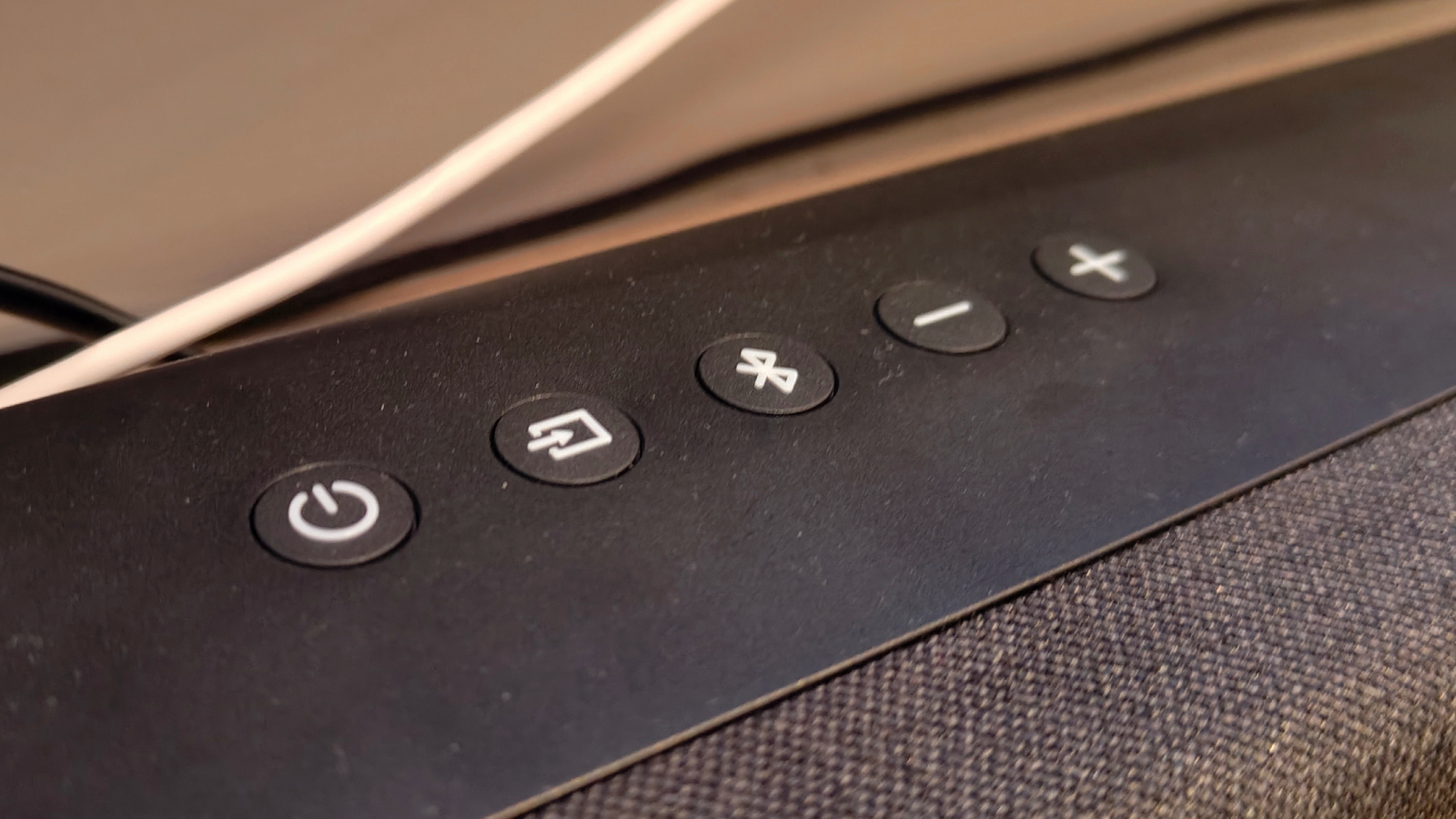
The "proper" way to set up the Fire TV Soundbar is to use the included cables to plug it into the TV set that your Fire TV device is plugged into… I think, but by TV wouldn’t recognize the soundbar when I did this, nor did my Fire TV Cube.
It doesn’t help that the in-box and online instructions are both complicated and vague, so I struggled to find a solution for my issue, hence the Bluetooth workaround.
With my solution, I have to turn on the Fire TV Soundbar via its own remote, turn on my TV with its remote, and then control my Fire TV Cube with a separate remote (three remotes in all, not exactly ideal). But it was the only solution I found that worked.
If you’re lucky enough to own a TV that recognizes your soundbar, I can only presume that the set-up process will be a lot easier.
Amazon Fire TV Soundbar day-to-day use
- EQ mode lets you toggle between dialogue, music and movie balances
- Bass booster mode does what it says on the tin
- No equalizer for advanced music tweaking
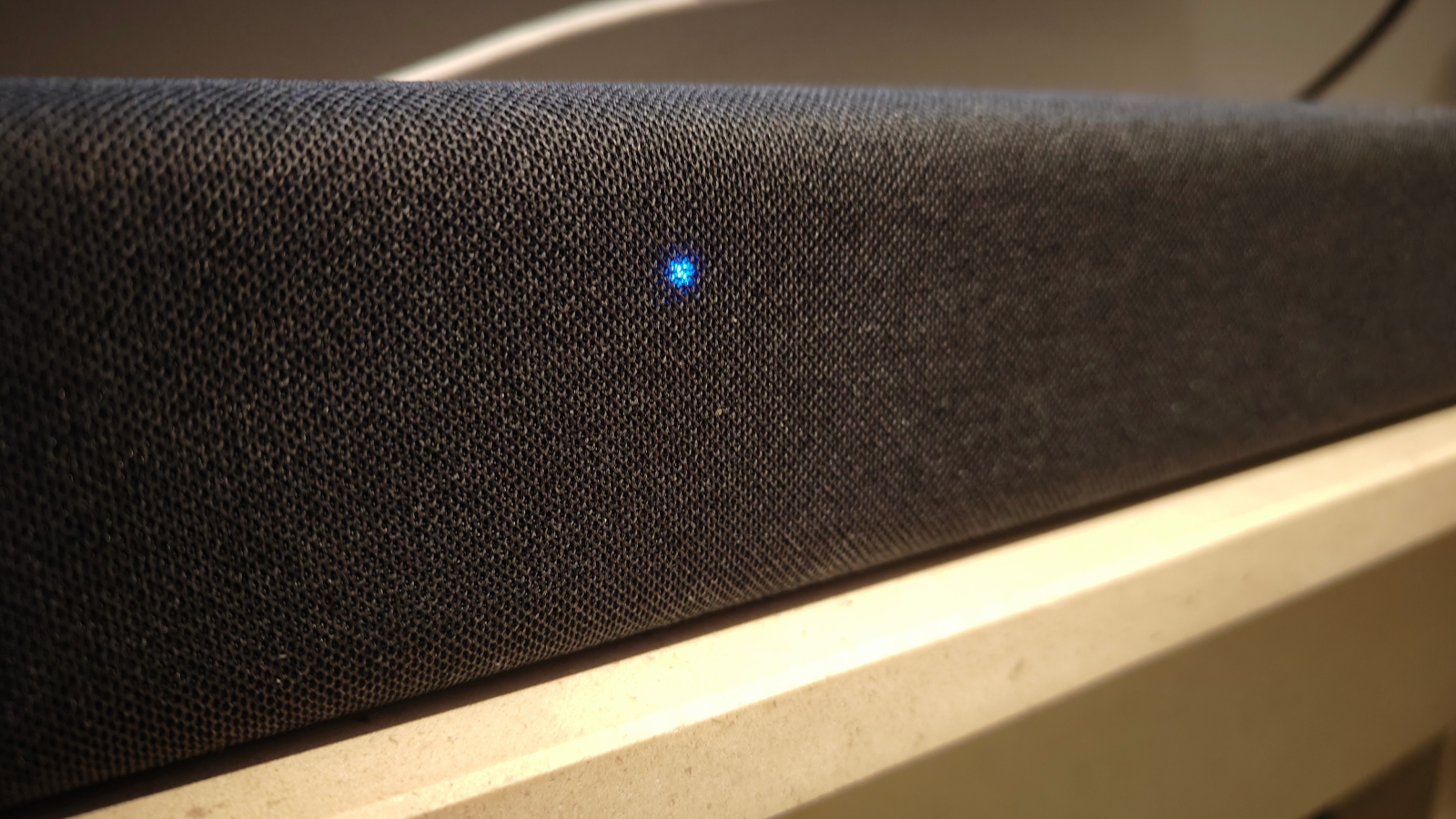
The Amazon Fire TV Soundbar isn’t exactly something you "use" — it takes very little input after setting it up, but there are a few things you have control over.
One of these is EQ, with the remote offering three different modes that you can flip between. These are dialogue, music and movie, with each slightly altering the sound balance that the bar offers.
I found the first best for news TV, sports and factual programming, the middle option preferable for when I was using my TV to play music (obviously) as well as musicals and movies with great scores, and the latter best for narrative TV shows and movies. By default I’d stick to dialogue, though, as I found movie and music sometimes could make dialogue harder to hear than I’d like.
Another thing you can control is the bass, with as you can flip between three levels of bass boosting. For general TV watching I found the changes negligible, but when I was listening to music it was more audible.
That’ll be good news for people who use their TVs to play music because there’s no equalizer beyond these two options.
Amazon Fire TV Soundbar remote
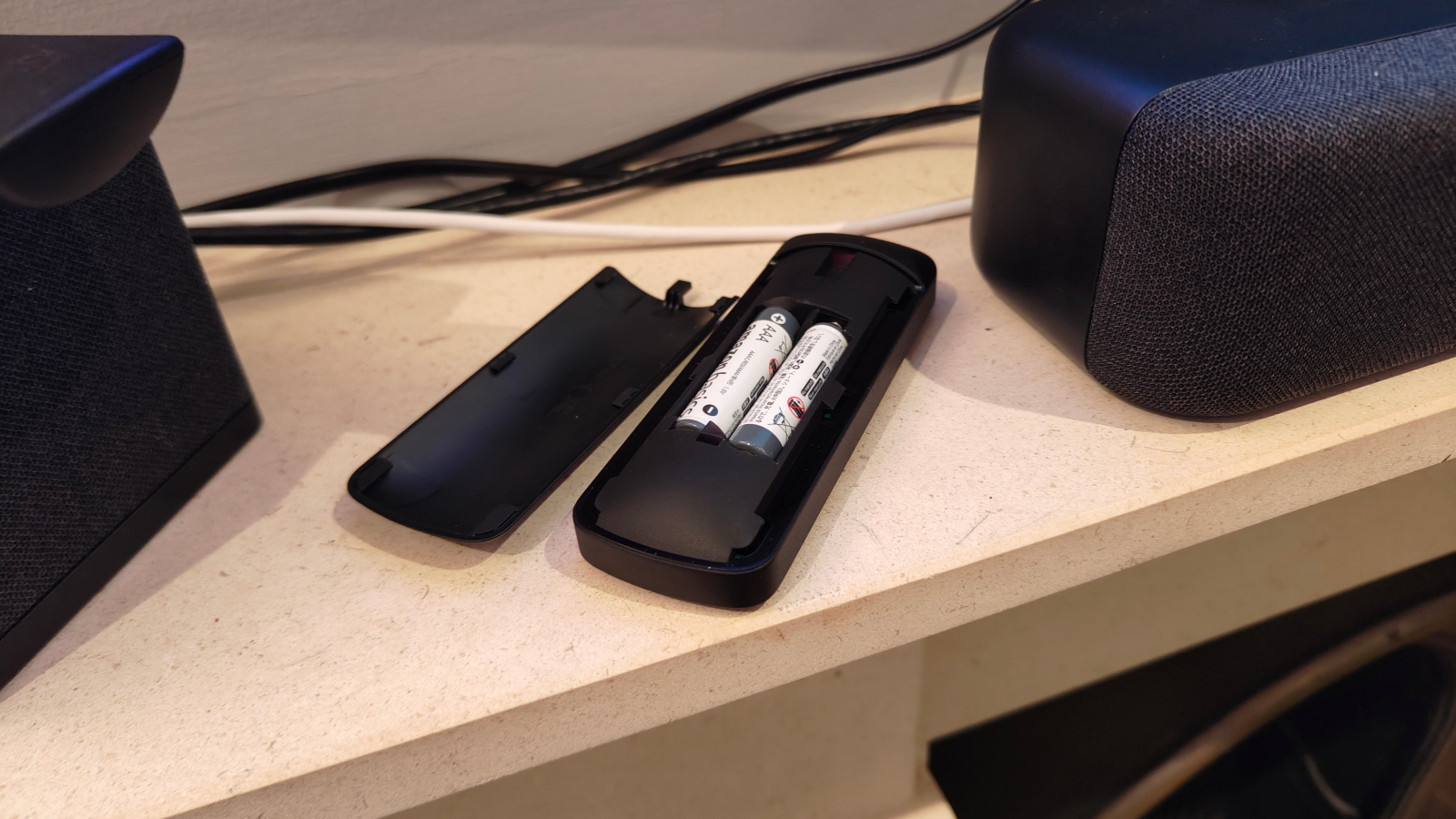
- Can't be used to navigate Fire TV
- A few buttons for bass, EQ and volume
- Useful for music playback
The Fire TV comes with a small remote, which will look pretty stumpy compared to the standard Alexa remote.
Topping this remote are the power on button and Bluetooth pairing button; the latter is only important for set-up. The former is presumably unimportant if you pair the soundbar directly to your Fire TV stick but, as I’ve mentioned, I didn’t manage this.
Other options on the remote include a volume rocker and mute button, as well as the aforementioned EQ and Bass buttons. There’s also a track forward and backward button and play/pause option. Because of these last two I found myself using the Soundbar remote when streaming music through Spotify on my TV, particularly for the EQ and Bass toggles.
However when it comes to watching TV or movies, the remote wasn’t useful, as there’s no selection wheel, home icon or back button, nor is there any kind of voice navigation. I’d have to use my Fire TV Cube remote for these tasks.
Amazon Fire TV Soundbar video and audio quality
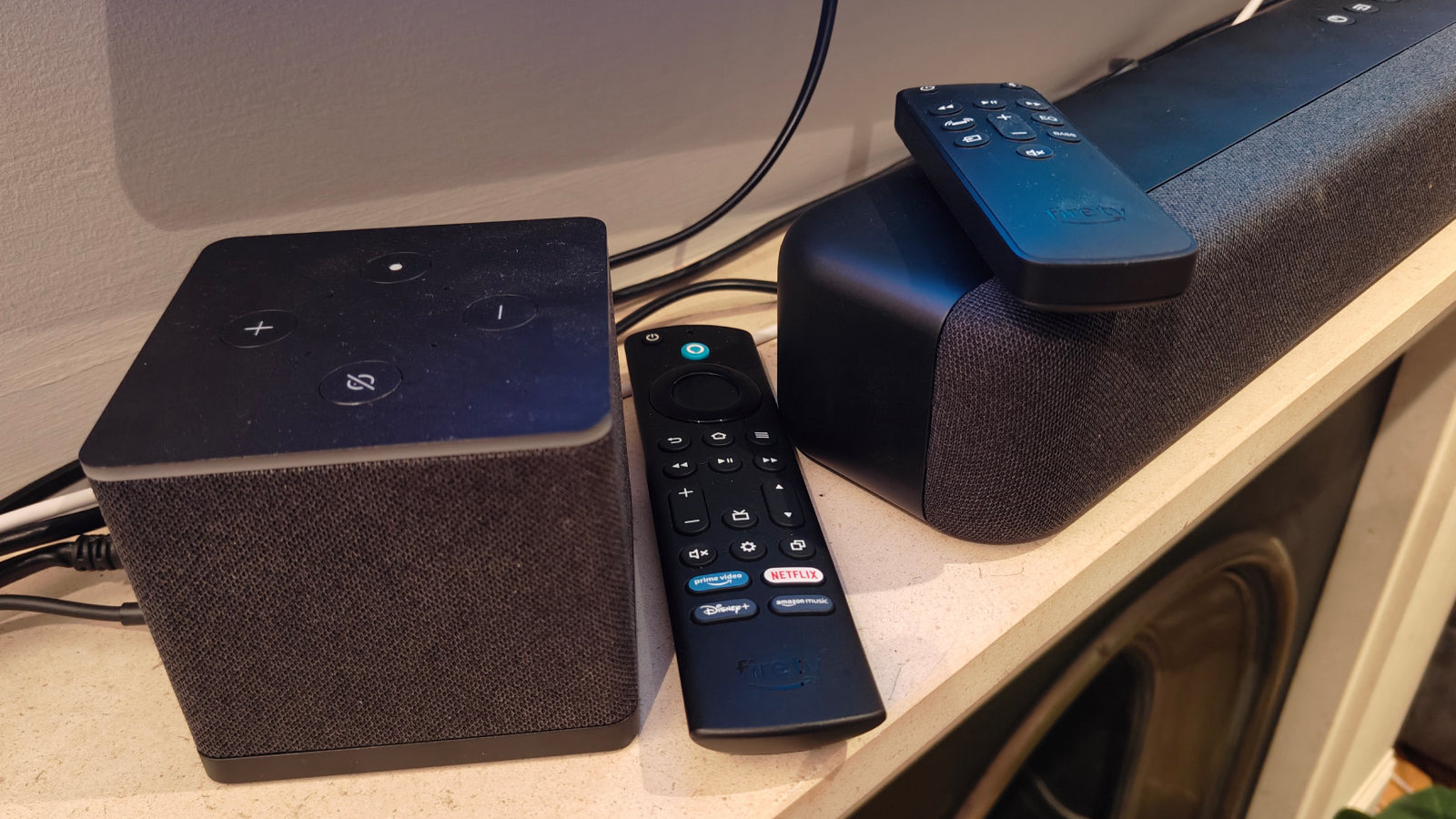
- Bass-heavy sound, though mid and treble can get lost
- High maximum volume
- Dolby Atmos and DTS:Virtual X for improved sound
Perhaps the most noticeable blessing that the Amazon Fire TV Soundbar brings is that it offers a lot more bass than standard TV set speakers, which was particularly palpable for music, but also drastically improved the sound of movies and TV shows by adding depth to their soundtracks.
Bass is the emphasis and if you use the aforementioned bass boosting mode, you’ll notice the downside to this: higher-pitched sound could sometimes be lost in the mix as a result.
In music, mid sounds in particular struggled to be made out, and even treble would be poorly-defined in some tunes. Turning on TV and movies, this affected dialogue that could sometimes be less clear than I’d like, and also sometimes background sounds and sound effects.
It wasn’t a big issue, and it unequivocally improved the sound of everything I watched, but pricier soundbars will offer you better balance. I imagine it’ll be even less of an issue for bass-heads who use their TV to play music a lot — I used the Fire TV Soundbar to play music at a party I hosted and the thumping bass offered by the bar was a hit.
One reason you might opt to buy the Fire TV Soundbar is the volume alone — the device offered a much louder top volume than my TV set. Room-filling audio like this will be a boon for people who find that their TV is a little on the quiet side.
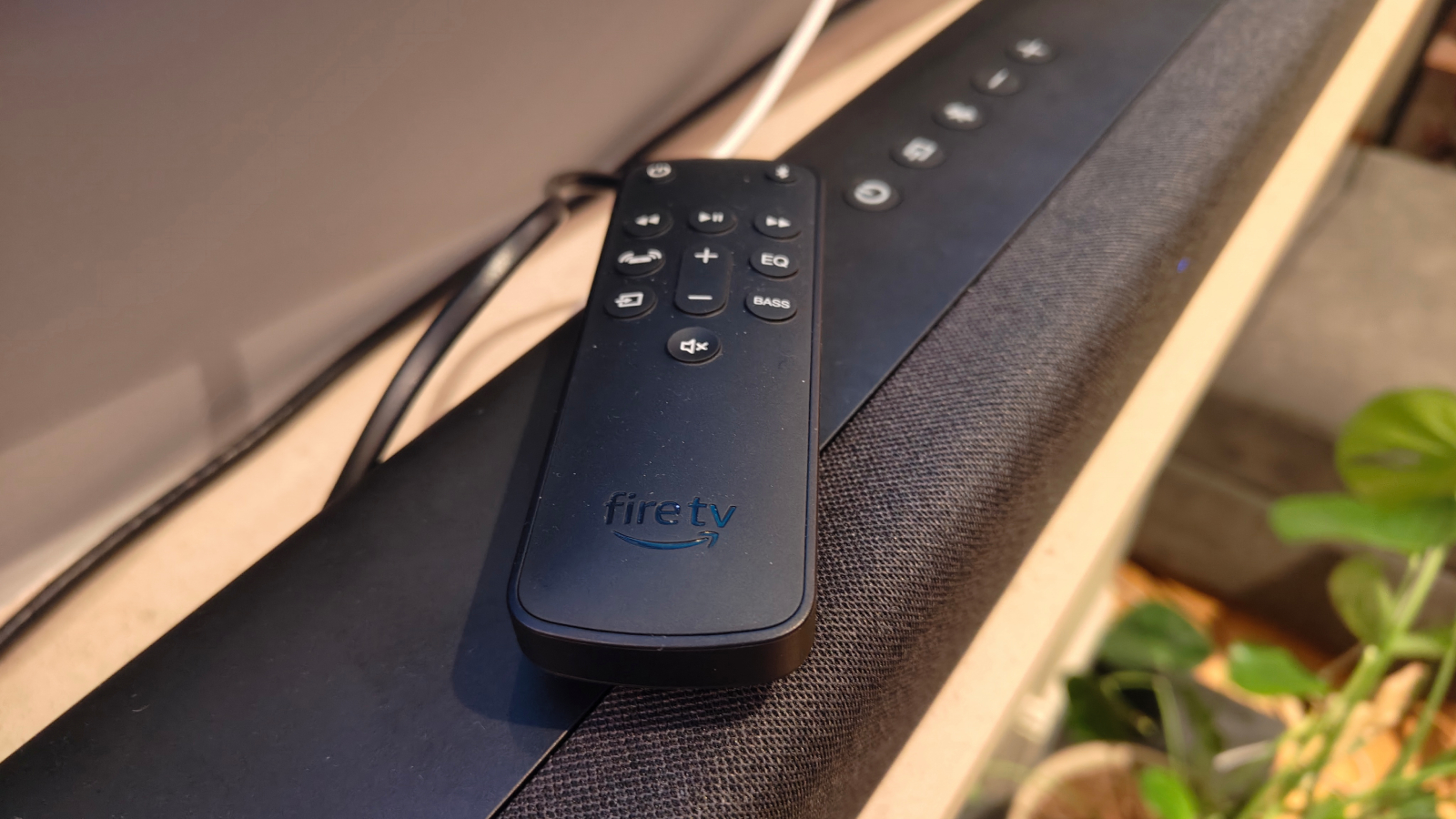
I mentioned two bits of tech jargon earlier that I’ll explain now: Dolby Atmos and DTS: Virtual X.
Dolby Atmos is tech which pans sounds to different angles; it’s like surround sound however that music tech only pans music left and right, whereas Atmos gives a feeling of altitude too.
The point of this is that, when you’re watching a show, you can get more immersive sound that seems to surround you. A plane flying overhead will actually sound like it’s above you, while an explosion on one side of the character will come from the same side of the screen. It’s a tech that began in fancy theaters but now you can get it from your TV, with gadgets like the Fire TV Soundbar. It works really well, and made movies that little bit more enjoyable when watched on the bar.
DTS: Virtual X largely does the same, but with an emphasis on high-quality sound to make your audio more detailed, and it’s more generally used for music. It too works well, and it contributes to the sound that I described above.
While DTS will go some way to make audiophiles happy, I generally wouldn’t recommend this soundbar for that kind of audience. If that’s you, a pricier soundbar or HiFi speakers are what you need.
Is the Amazon Fire TV Soundbar worth buying?
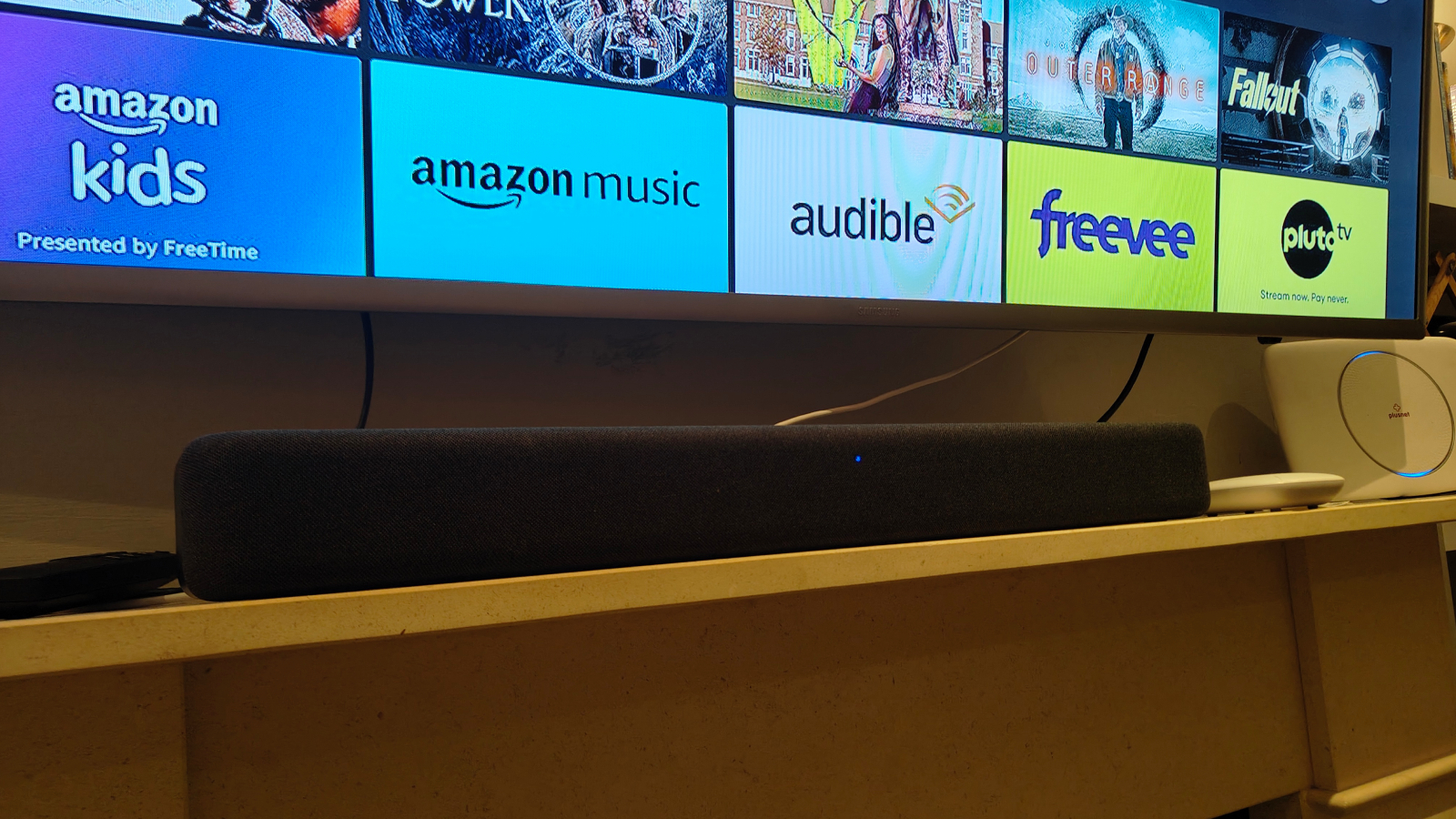
If, like me, you have a low-end or mid-range TV, I’d really recommend the Amazon Fire TV Soundbar. It’s fairly affordable so it won’t break the bank, and it’ll bring noticeable improvements to both movies and music. I’m not looking forward to returning my review unit!
The Fire TV Soundbar is particularly targeted at people who haven’t used a soundbar before. Its entry-level price and relatively limited lack of EQ options will give prospective home theater owners a few options so they can dip their toes in the water without spending too much money.
However if you’re an audiophile who knows the exact equaliser balance for each genre of music, want totally balanced sound or need the best audio available at any cost, you’ll find more expensive options on the market will suit you.
Likewise if you really couldn’t care less about how your TV sounds, you don’t need the soundbar. If you only use your set for the news, for factual entertainment or for older broadcast shows (IE, things for which the sound balance isn’t a huge part of the experience), you could probably save your money.
Competition
- The Roku Streambar is a soundbar and streaming stick in one, selling at the same price as the Fire TV Soundbar but removing the need for a streaming stick. It also has a more affordable Streambar SE and pricier Streambar Pro option in some regions.
- For a similar price the Sony S100F comes from a reliable tech company. It has a special bass speaker and is very slender, so it'll fit on small shelves.
- If you don't mind paying a bit more the Sonos Beam remains a great option from a reliable audio company, offering great music playback and high-resolution sound.
- A much pricier option from the same company is the Sonos Arc, and while it's still not the most expensive soundbar out there, it'll blow most people away.
More on Amazon Fire TV devices
- How to turn off an Amazon Fire TV Stick
- How to get Netflix on an Amazon Fire TV
- Amazon Fire TV Stick vs Fire TV Stick 4K comparison
- Amazon Fire TV Stick vs Fire TV Cube comparison
How I tested the Amazon Fire TV Soundbar
I've gone into lots of my situation with the Amazon Fire TV Soundbar regarding pairing and connectivity. It was used alongside a Samsung K5600 5 Series Smart TV as well as an Amazon Fire TV Cube for the entirety of its two-week testing process.
During those weeks I regularly used the Fire TV Soundbar to stream TV shows on Disney Plus, movies on Prime Video and Netflix and music on Spotify, and I also dabbled with a few different apps for testing purposes.
I've been testing tech gadgets for nearly 6 years now, so have experience with many different type of product. I have tested several streaming device for What to Watch and regularly contribute headphone, earbud and speaker reviews for our sister website TechRadar so I'm well versed in both types of device.







